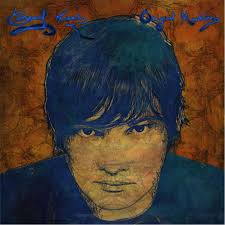By looking at a tracklist that features 24 items, most running for only a minute or two and with precious few over the three-minute mark, you can make judgements about Conrad Keely’s first official solo album. It’s either a complete refusal to edit indulgence, or it’s a series of unfinished doodles, right? Keely has form for both in collaboration with …And You Will Know Us By The Trail Of Dead (and I’m personally all for it), but for Original Machines these vignettes are something different. With ToD, they’re usually placed in the context of a suite, or propelled along by that band’s fearsomely effective rhythm section, so that any gaps in imagination are well and truly pummelled out of your awareness. Here, they’re blips and glances.
Songs that would normally have been worked up into parts of larger suites with ToD are slapped into the track list as they are, with their workings completely clear to see. It makes for a pleasingly interactive listen: you can imagine Keely’s composition process during songs like ‘Lost The Flow’, a childlike melody at its heart and nothing more than busy guitar drones and repeated shouts of "ooh-WOAH-oh!" to sustain it. And when that’s all a song needs, it’s perfectly fine: there’s a spark of imagination and Keely gives it nothing more than it requires to succeed. In a way, it’s the perfect songwriting method, one that eliminates listener fatigue completely.
However, when Keely gets bored with an idea that clearly doesn’t work, he just stops it dead where it is, rather than making the grown-up decision to not include it on the album. Reduced to its constituent parts, ‘Your Tide Is Going Out’, for example, is not enough: Keely’s spirited evocation of Roger Daltrey on Quaaludes is fine, but the bass line seems to have had all personality eroded from it, leaving only a mere impression.
Far more successful are the sketch-like pieces directly inspired by Keely’s adopted home of Phnom Penh in Cambodia and his various international travels. ‘The Jungles’ is a a Looney Tunes score as performed by a Gamelan orchestra in the recovery position, while ‘Waimanalo Drive’ (presumably named after the beach in Hawaii) could be the ethereal opening of a Peabo Bryson ballad, all synthesised chirrups and shuffles. ‘Marcel Was Here’ is only 30 seconds long, but it’s easily the most sonically adventurous thing on the whole record, calling to mind the impish gait of Deerhoof at their most capricious.
Unlike Keely’s gaggle of superb ToD albums (and we must compare it to those albums) there’s little sense of spectacle on Original Machines: and this is not necessarily a bad thing. Instead, it has about it the feel of a large canvas upon which the artist has painstakingly rendered postcard-sized individual scenes. They’re arranged on the canvas without too much thought, so that we can simply tour its best bits and skip over its occasional failures. If you’re looking for ToD’s grandeur, pomp and epic visionary scope, you may be disappointed. Keely’s is a singular mind that luxuriates in its own logic, but on Original Machines it luxuriates a little too much. Cheeringly, though, there are superb moments and doodles, the pace of which makes for an inventively utilitarian listen.


